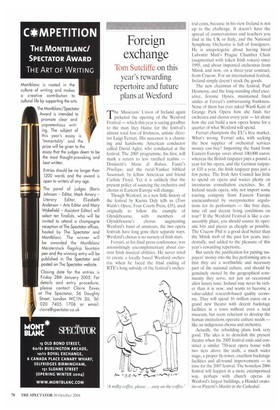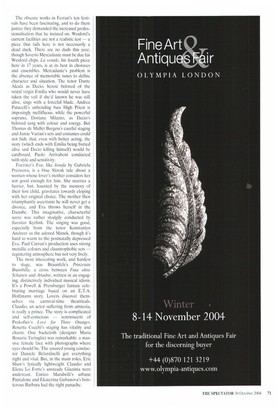Foreign exchange
Tom Sutcliffe on this year's rewarding repertoire and future plans at Wexford
rr he Musicians' Union of Ireland again picketed the opening of the Wexford Festival — which this year is saying goodbye to the man they blame for the festival's almost total loss of Irishness, artistic director Luigi Ferrari. His successor is a charming and handsome American conductor called David Agler, who conducted at the festival. The 2005 programme, his first, will mark a return to less rarefied realms — Donizetti's Maria di Rohan, Faure's Penelope, and the rural-Yankee biblical Susannah, by fellow American and friend Carlisle Floyd. Yet it is unlikely that the present poky of sourcing the orchestra and chorus in Eastern Europe will change.
Though Wexford, as a new little history of the festival by Karina Daly tells us (Tom Walsh's Opera, Four Courts Press, £35), used originally to follow the example of Glyndebourne, with members of Glyndebourne's chorus augmenting Wexford's band of amateurs, the two opera festivals have long gone their separate ways. Wexford's chorus is no nursery of Irish stars.
Ferrari, at his final press conference, was astonishingly uncomplimentary about current Irish musical abilities. He never tried to create a locally based Wexford orchestra, when he faced the final ending of RTE's long subsidy of the festival's orches tral costs, because in his view Ireland is not LIP to the challenge. It doesn't have the spread of conservatoires and teachers you find in the UK or Italy, and the National Symphony Orchestra is full of foreigners. He is unapologetic about having hired Lubomir Matl's Prague Chamber Choir (augmented with token Irish voices) since 1995, and about imported orchestras from Minsk and now, on a three-year contract, from Cracow. For an international festival, Ireland simply doesn't stock the goods.
The new chairman of the festival, Paul Hennessy, and the long-standing chief executive, Jerome Hynes, maintained fixed smiles at Ferrari's embarrassing frankness. None of them has ever asked Wasfi ICani of Grange Park Opera how she finds her orchestra and chorus every year — let alone how she can build a new opera house for a quarter of what Wexford will spend.
Ferrari champions the EU's free market. What's wrong, Ferrari asks, with seeking the best supplier of orchestral services money can buy? Importing the band from Eastern Europe saves about 100,000 euros: whereas the British taxpayer pays a pound a year for his opera, and the German taxpayer £10 a year, the Irish taxpayer pays just a few pence. The Irish Arts Council has little to spend on opera and wastes plenty on incestuous consultation exercises. So, if Ireland needs opera, why not import some touring company from Eastern Europe unencumbered by overprotective regulations for its performers — like free days, time off and decent living conditions on tour? If the Wexford Festival is like a carassembly plant, you should source its operatic bits and pieces as cheaply as possible. The Cracow Phil is a good deal better than the Minsk mob of the past few years, incidentally, and added to the pleasure of this year's rewarding repertoire.
But surely the justification for putting taxpayers' money into the live performing arts is that they are a worthwhile and necessary part of the national culture, and should be genuinely owned by the geographical community they serve, not just an occasional alien luxury taste. Ireland may never be richer than it is now, and wants to become a value-added research-based quality economy. They will spend 16 million euros on a grand new theatre with decent backstage facilities in a town without even a local museum, but seem reluctant to develop the human institutions operatic culture needs — like an indigenous chorus and orchestra.
Actually, the rebuilding plans look very good. The idea is to demolish the present theatre when the 2005 festival ends and construct a similar 750-seat opera house with two tiers above the stalls, a much wider stage, a proper fly-tower, excellent backstage facilities and all-round improvements — in time for the 2007 festival. The homeless 2006 festival will happen in a more extemporised way, perhaps with church operas in Wexford's largest buildings, a Handel oratorio or Pizzetti's Murder in the Cathedral. The obscure works in Ferrari's ten festivals have been fascinating, and to do them justice they demanded the increased professionalisation that he insisted on. Wexford's current facilities are not a realistic test a piece that fails here is not necessarily a dead duck. There are no duds this year, though Saverio Mercadante must be due his Wexford chips. La vestale, his fourth piece here in 17 years, is at its best in choruses and ensembles, Mercadante's problem is the absence of memorable tunes to define character and situation. The tenor Dante Akala as Decio, heroic beloved of the vestal virgin Emilia who would never have taken the veil if she'd known he was still alive, sings with a forceful blade. Andrea Patucelli's unbending bass High Priest is imposingly mellifluous, while the powerful soprano, Doriana Milazzo, as Decio's beloved sang with colour and energy. But Thomas de Mallet Burgess's careful staging and Jamie Vartan's sets and costumes could not hide that, even with better acting, the story (which ends with Emilia being buried alive and Decio killing himself) would be cardboard. Paolo Arrivabeni conducted with style and sensitivity.
Foerster's Eva, like .lenufa by Gabriela Preissova, is a blue Slovak tale about a woman whose lover's mother considers her not good enough for him. She marries a furrier, but, haunted by the memory of their lost child, gravitates towards eloping with her original choice. The mother then triumphantly ascertains he will never get a divorce, and Eva throws herself in the Danube. This imaginative, characterful score was rather stodgily conducted by Jaroslav Kyzlink. The singing was good, especially from the tenor Konstantyn Andreev as the adored Manek, though it's hard to warm to the postnatally depressed Eva. Paul Curran's production uses strong metallic colours and claustrophobic sets registering atmosphere but not very lively.
The most interesting work, and hardest to stage, was Braunfels's Prinzes.sin Brarnbilla, a cross between Frau ohne Schatten and Ariadne, written in an engaging, distinctively individual musical idiom. It's a Powell & Pressburger fantasy celebrating marriage based on an E.T.A. Hoffmann story. Lovers discover themselves via carnival-time theatricals. Claudio, an actor suffering from amnesia, is really a prince. The story is complicated and self-conscious — reminiscent of Prokofiev's Love for Three Oranges. Rosetta Cucchi's staging has vitality and charm. One backcloth (designer Maria Rosaria Tartaglia) was remarkable: a massive female face with photographs where eyes should be. The assured young conductor Daniele Belardinelli got everything right and vital, But, in the main roles, Eric Shaw's lyrically lightweight Claudio and Elena Lo Forte's unsteady Giazinta were undercast. Enrico Marabelli's urbane Pantalone and Ekaterina Gubanova's boisterous Barbara had the right panache.



















































































































 Previous page
Previous page